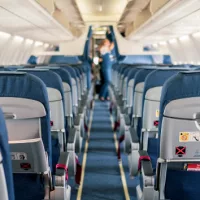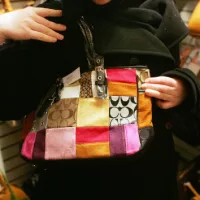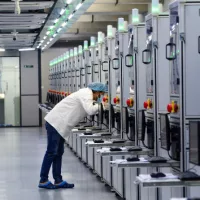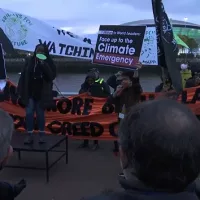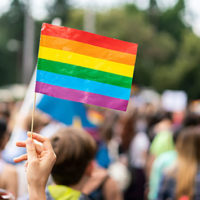
iStockBy: JOSHUA HOYOS and VICTORIA MOLL-RAMIREZ, ABC News
(NEW YORK) — It was the longing for a safe space that drove Alexi Minko to go from being a lawyer to running a bar.
“I had the determination to open a space that was for my community: Black, brown, people of color and LGBT,” Minko, the owner of Alibi Lounge in Harlem, Manhattan, told ABC News.
The battle to open a safe and inclusive space couldn’t prepare Alibi, the last self-described gay bar owned by a Black person in New York City, for the arrival of COVID-19.
“Nobody knew when it was going to be open again,” he said, thinking that a final goodbye party was in store for the bar. “And then on Monday afternoon, they said ‘actually, you’ve got to go now.'”
It took a couple days until Minko remembered that there were a number of bills that were stacking up — from the sales tax to rent and final paychecks, the crisis was starting to settle in.
Normally, Minko’s Alibi would be one of the many LGBTQ-owned businesses that would see an influx of business as a result of Pride Month, a time to remember the struggles, progress and ongoing work of the LGBT community.
The LGBTQ+ community accounts for $917 billion spending dollars, according to Jonathan Lovitz, senior vice president for the National LGBT Chamber of Commerce.
“Well, not only is that a powerful figure that gets corporate America’s attention, it also reminds us of the power of our loyalty and why corporations, why government agencies need to be so respectful of, and inclusive of our communities,” Lovitz said.
A recent study from the NGLCC showed that LGBTQ-owned businesses account for $1.7 trillion in America’s economy which, if translated into its “own country, we’d be the 10th wealthiest in the world” Lovitz noted.
“We’re talking about mom and mom and pop and pop shops on Main Street doing a few thousand dollars as a side business, up to LGBT-owned multinational companies worth tens of millions and employing hundreds of people,” he said.
It’s businesses like the Violet Valley Bookstore which Jamie Harker has made a part of the 3,400 person town of Water Valley, Mississippi, since 2017.
People “have been able to listen beyond simply hearing ‘gay’ and see that this bookstore has something for everyone. It has a particular mission for feminist and queer folks, and we order new books to make sure we always have a good selection,” Harker told ABC News.
Harker, who is also a professor of English and the director of the Sarah Isom Center for Women and Gender Studies at the University of Mississippi, said the bookstore is also a safe space for LGBTQ+ youth in the area to explore works that would not exist otherwise in their communities.
“I had a young woman come in and when I showed her the LGBTQ+ literature section, she said, ‘I didn’t know there were so many.’ And I said, ‘This isn’t even close to all of them.’ We also have a particular focus on Southern LGBTQ+ literature,'” Harker noted.
As cases of COVID-19 have been on the rise in Mississippi, the Violet Valley Bookstore has been forced to close its doors again.
“I am going to close the bookstore for the month of July. I hate to close again so soon, but the safety of my customers comes first,” the bookstore announced on Instagram adding that they hope to reopen again in August.
As Lovitz said, LGBTQ businesses span across all industries, but very few see the same level of community or place of release like a gay bar where on any given night a drag queen like Nina West would be performing for a crowd.
“From March 13 to maybe March 27, I literally saw everything on my calendar go away,” said West, who won the Miss Congeniality title on season 11 of the Emmy-winning show RuPaul’s Drag Race. West’s summer was supposed to include a comedy tour and an anticipated musical production.
“The bartenders, barback, door security, servers, management, DJs, lighting operators, drag queen/kings, burlesque performer … I mean this economic impact [on] nightlife is huge,” West said.
Months into the pandemic, West now finds herself left with hundreds of dollars in wigs, makeup, merchandise and the realization that how she would normally interact with fans has been forever changed.
“We will not be able to go back to operating with taking cash tips unless people are wearing gloves … I remember feeling it when I was a young, little baby gay and conversely, on the other side of it, I feel it as the entertainer, if you’re taking that tip from someone who worked really hard for their money… that audience relationship is sacred,” West said.
From her home in Columbus, Ohio, West discussed the importance of bars to create safe spaces for the LGBTQ community.
“I was raised in a gay bar and the bar was really the LGBTQ, the queer community’s church,” she said.
Minko has seen his share of issues — including a June 2019 incident where two rainbow Pride flags were burned at his bar. But the man who emigrated from the central African nation of Gabon said the last remaining vestige of the Black-owned LGBTQ business was saved because of the next generation.
A number of young people, coordinated by a young man named Malik Saaka, suggested Minko start a GoFundMe account, something which he was originally uncomfortable doing.
“I felt so horrified to ask people for money. I thought, if it reaches $1000, I’m happy. And then in one week, there is over $100,000,” Minko said.
The GoFundMe came after two rejections for the Paycheck Protection Program for much needed funding. Minko was approved for a PPP loan after reaching out to the Small Business Association’s Network for LGBT Businesses.
“I really want to thank anyone who has given $2, $1,000 because they have no idea how more than even the financial aspect… it is feeling loved,” he said.
West said she takes stock in the moment, eager that it will create a new space for traditionally marginalized voices in the queer community to come forward.
“The hope is that we hear Trans people, when they tell their stories. We hear Trans women of color when they tell their stories, and we use our voice to protect them and to amplify,” she said.
West looks forward to reuniting with the community in their safe space, albeit more accepting of each other. When “we get back together, we know how to talk to one another a little bit better and we know how to open up our doors to everybody in our community and not just the people who are pretty or the people who are white or the people who are men,” she said.
It’s like the bookstore — nestled 18 miles south of Oxford, Mississippi, – which serves as a reflection of how LGBTQ businesses play a larger role in their communities.
“My wife came by to see me one day and said, “Who is that guy in the camo?” I said, “Oh, he comes in all the time. He loves mysteries and he buys a big stack periodically,” Harker said. “As long as you don’t mind coming past my rainbow flag, you are welcome to come in and I’ll talk books with you all day long.”
Copyright © 2020, ABC Audio. All rights reserved.






